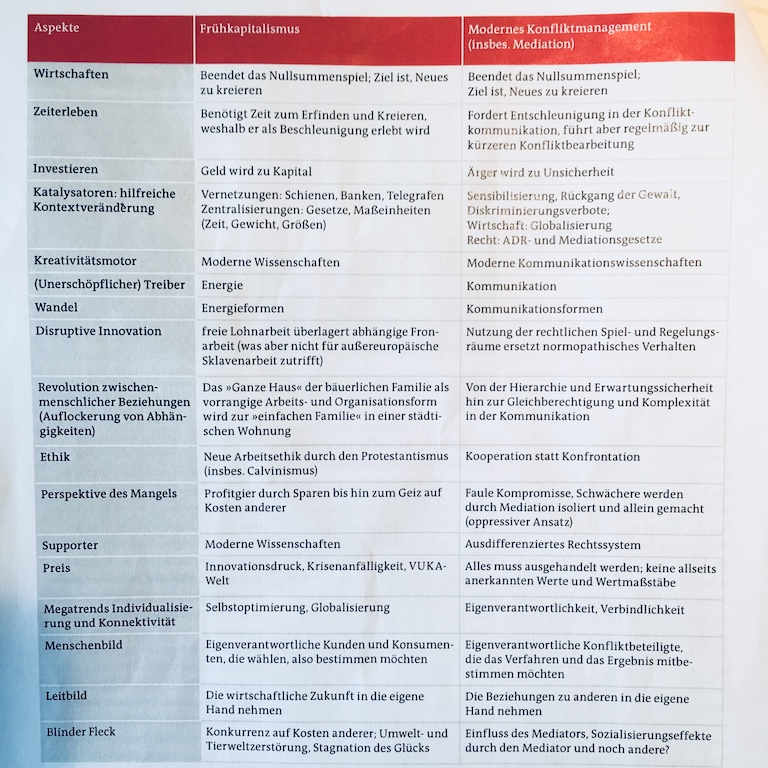Photo by Gianna Ciaramello on Unsplash
Essay: Strategic Mediation. A plea for an overdue change of perspective
Part 2: Mediation and capitalism
Spektrum der Mediation, Issue 71, p. 26 – 30.
Excerpts:
It seems an irony of history that mediation wanted to enlarge the cake, but rejected the capitalist legacy outright.
Mediation not only requires a forward-looking product to support people and organisations, but also clarity about its own spiritual roots. In times of religious wars, humanism was by no means only aimed at pacifying people among themselves and provided religious images of humanity that are still effective today. The Humanism also aimed at the material satisfaction of peoplewhich Mastery of all life, including your own.
Capitalism is generally not considered to be (morally) good, but people are. Which is why both man and the capitalist economy are seen as contradictory and in conflict. It is capitalism that incites human greed, and thus also inhuman behaviour; it awakens the worst human instincts and destroys interpersonal relationships. This view may have its logic, but it fails to recognise historical facts.
Human greed is thousands of years older than capitalism – and humans, Homo sapiens, have not behaved better towards other human species or other animals without capitalism, nor towards each other. On the contrary, Homo sapiens became more friendly, or at least more peaceful, with each other when capitalism began to spread. And it is no coincidence that this happened in the same place, in Europe. It was here that the conditions necessary for capitalism were created.
Economy 3.0
After humans became increasingly less nomadic hunter-gatherers (economies 1.0) and became sedentary farmers during the Neolithic Revolution (around 12,000 years ago, economies 2.0), for thousands of years, until around the 15th/16th century, they Economy as a zero-sum game operated: What some had, others could not have. Wealth was therefore frowned upon and had to be acquired at the expense of others. Money and other material wealth was not used to build a better future, was not yet capital, but was hoarded by some (e.g. the church) and squandered by others (e.g. the nobility). It was only the early capitalists who utilised their money as capital, used it to increase its value and thus invested in a better future. That was a astonishingCultural achievement of mankindwhose central contextual condition consists of A future that can be shaped to see.
Mediation faces a parallel problem:
The game is to be fundamentally changed, from a zero-sum game to a winning game. At worst, one player should win more than the other, but in any case no loser should be left behind. This is the win-win idea that has been thrust into the limelight. It may sound like a catchphrase, but it obscures the actual payment situation. As in business, the same applies to mediation: first you have to pay and invest. And with trust in a future that can be shaped together. This trust does not grow in peaceful coexistence, but at best in (resolved) conflicts.
Mediation is the event that demands the unheard-of: Trust in times of mistrust!
Mediation is the solution to the restrictive problem definition that traditional conflict management is a zero-sum game. This is exactly what mediation wants to change.
Mediation also aims not just to redistribute the cake that is being fought over, but to enlarge it, to end the zero-sum game and to gain something for everyone.What thought has ever been more materialistic and capitalistic?
Capitalism has heralded one of the most significant changes of perspective in human history – how this happened is a lesson in mediation.
…What capitalism is all about....
- Interpreting the future as a mouldable reality,
- no longer see conflict management as a zero-sum game,
- but to increasingly endeavour to cultivate other, profitable expectations,
- realise the potential of a win-win situation,
- and to invest together with optimism and trust
…That's what mediation is all about!
Mediation and capitalism are co-operation mechanisms that can make the cake bigger for everyone.
I would be delighted if you could share your thoughts and reflections on this article with other readers in the comments. I will endeavour to respond in a timely manner.

Note: A blog post will soon be published on INKOVEMA, which will take up and explain further historical details and parallels (see photo) that could not be included in the publication.





Leave A Comment